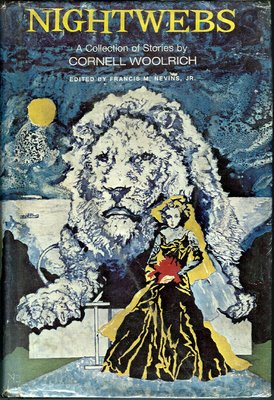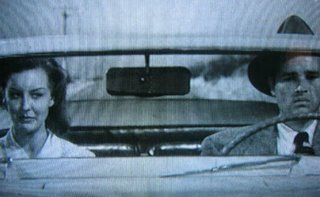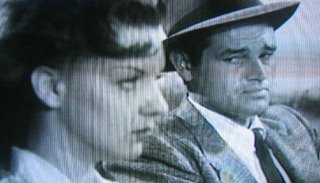Finally, after several years of this I asked why he whispered inside yet talked in a normal voice when he got outside the building. He glanced up at some radiant heating units that were suspended from the ceiling. "Ain't them things microphones?" he asked.
Willie thought that everything the employees said was being piped right into our bosses' offices. Why anyone would want to listen to us was up for conjecture, but on Willie's part that was paranoia, of course. In those days I didn't recognize it like I do today, but I didn't read body language as well, either. When Willie spoke in that whisper he moved in close and his eyes narrowed into what I came to call the paranoid squint. I noticed that often when people talked of subjects that made them paranoid they often narrowed their eyes, and looked furtively side-to-side, making sure no one could overhear what they were about to say.
Over the weekend I watched a really great old time noir film, Detour(1945) which is famous for being made so cheap (reputedly $66,000) in six days of filming. It's also a classic of paranoia, which is what the best noir is. It's actually one of the great themes of movies and literature, too, that someone is after the main character. Usually it's a murderer, but oftentimes it's the police, or "the government," or especially a government agency which is mysterious to us, like the CIA. Detour is more about events beyond his control propelling the main character into a paranoid nightmare, and has several incidents of one character being suspicious of another--and for good reasons, too.
The 1940s and early 1950s were good for telling this type of story, because of the way the world changed after World War II. Paranoia is nothing new. I'm sure that 50,000 years ago Og was paranoid about his brother, Zog, conking him with a stone ax while he slept, and taking over the whole cave and all of the women.
In real life we dismiss peoples' paranoid fears* as fears without justification, but in fiction paranoia is a great plot device, and the mysterious "they" chasing the main character are very real.
Some early paperback authors, Jim Thompson and David Goodis, were great at telling this sort of story. Going back even earlier, Cornell Woolrich, who also wrote as William Irish, was excellent. You wonder whether it takes a paranoid to tell a paranoid's story.
 Detour is good because the paranoia is real. The main character is looking for an old girlfriend and becomes caught up in a swirl of events beyond his control, and gets in deeper and deeper with every scene. He and his leading lady also give each other the paranoid squint, which is a dead giveaway.
Detour is good because the paranoia is real. The main character is looking for an old girlfriend and becomes caught up in a swirl of events beyond his control, and gets in deeper and deeper with every scene. He and his leading lady also give each other the paranoid squint, which is a dead giveaway.


Ciao for now, El Postino
*It's hard not to be paranoid about our government nowadays, with all of the technology making it easy for them to look in on us when we don't know it.

No comments:
Post a Comment